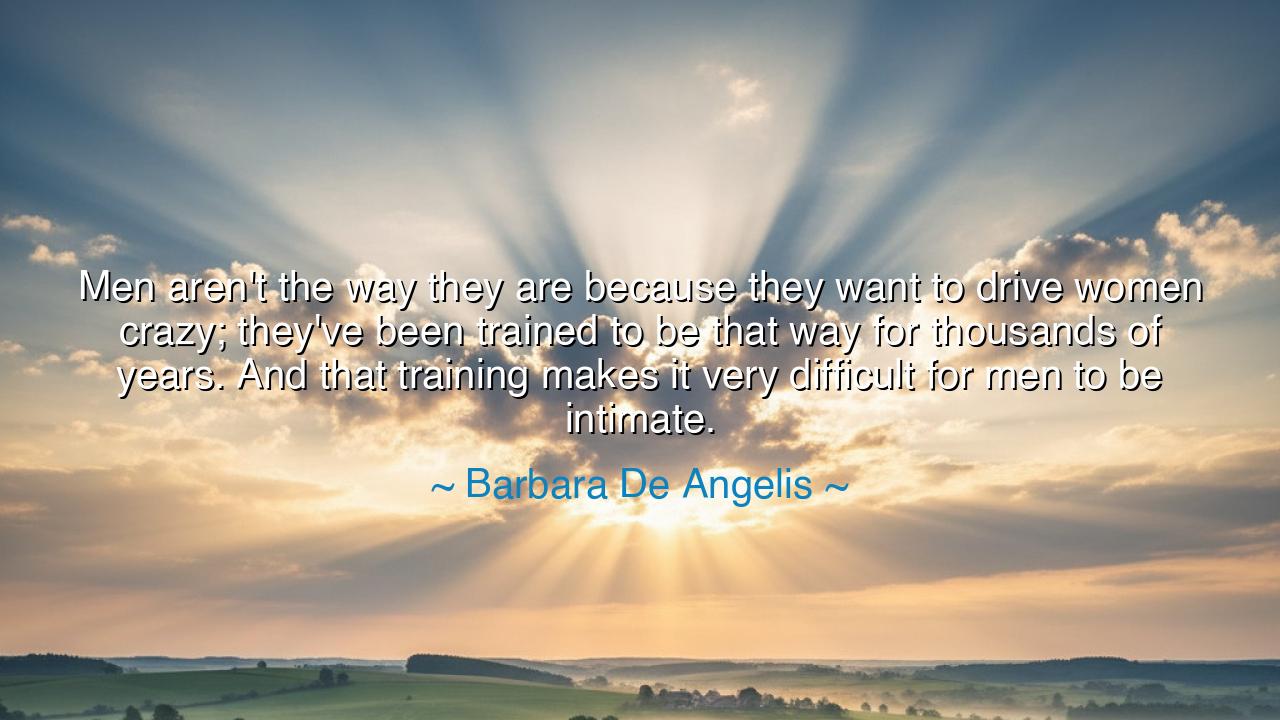
Men aren't the way they are because they want to drive women
Men aren't the way they are because they want to drive women crazy; they've been trained to be that way for thousands of years. And that training makes it very difficult for men to be intimate.






Barbara De Angelis speaks with the voice of an ancient seer when she declares: “Men aren’t the way they are because they want to drive women crazy; they’ve been trained to be that way for thousands of years. And that training makes it very difficult for men to be intimate.” In these words lies a lament, but also a call to awakening. They reveal that human nature is not always born of choice, but often shaped by long centuries of tradition, by the silent chains of training passed from father to son, age to age.
To understand this truth, we must see that men have not been enemies by desire, but prisoners of old customs. For thousands of years, the world exalted hardness and conquest in men, teaching them to wear armor over their hearts. In battlefields and marketplaces, they were told that tenderness is weakness and that vulnerability is shame. Thus, the art of intimacy, the gentle courage to unveil one’s soul, became a skill untaught, a flame left unlit.
History gives us many examples. Consider the samurai of Japan, warriors bound by honor yet forbidden to show tears or fear. Their training forged them into unyielding swords, sharp and disciplined, yet within their souls, many suffered in silence. A samurai could master death without trembling, but often could not confess love without breaking. Their greatness was shadowed by their inability to embrace intimacy, proof of how culture’s training can carve deep wounds into the human spirit.
De Angelis’s words are not condemnation but compassion. She reminds us that the difficulty of men in showing intimacy is not always a failure of the heart, but the result of millennia of training that glorified strength over softness. To heal this, both men and women must walk the path of unlearning, of stripping away the chains of inherited roles, and discovering once more the sacredness of vulnerability.
Let the generations to come be wiser. Let men be taught not only to fight, but to feel; not only to conquer, but to connect. For true greatness lies not in denying the heart, but in daring to share it. Only then will the ancient training lose its grip, and men will find that intimacy is not weakness, but the most powerful act of all—the act of being wholly seen, and wholly loved.






Kkietttt
De Angelis makes a compelling argument that societal norms have shaped men’s behavior over generations. But I wonder, does this mean that men are absolved of responsibility when they struggle to form intimate connections? At what point do we move from societal conditioning to personal choice, and how can men begin to unlearn this training? Should there be a greater focus on emotional intelligence education for men?
DTDoAn ThAi
This quote challenges the idea that men are naturally distant or emotionally unavailable. It suggests that society has molded them into this image over time. But do you think it’s possible for men to re-learn intimacy if they’ve spent their entire lives being trained otherwise? How can both men and women challenge the stereotypes and expectations placed on them to form more authentic emotional connections?
ATle thi anh tuyet
I find De Angelis' perspective on men’s behavior intriguing, as it suggests that men’s actions are not entirely their own choice but are influenced by centuries of societal expectations. Is this a valid excuse for men who struggle with intimacy, or should they take responsibility for overcoming these ingrained behaviors? How can modern men break free from these constraints and develop healthier, more intimate relationships?
GTvu gia tu
Barbara De Angelis brings up an interesting point about how societal conditioning impacts men’s ability to form intimate relationships. Could it be that the roles men are expected to play in society, such as being stoic or emotionally distant, actually hinder their emotional connections? Does this 'training' affect only men, or are women also socially conditioned in ways that limit their ability to connect deeply with others?